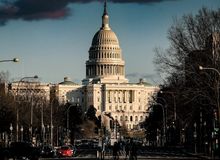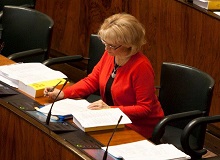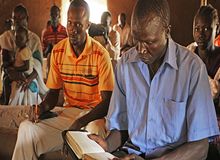

.png)
Evangelical politician Marc Jost: “In a society in which we often talk to each other via the media, we need conversations with ideological opponents”.

After a media storm around the role of evangelicals, the Evangelical Federation of Spain recommends Christian leaders “to avoid using their pastoral influence to condition the vote of believers”.
.jpg)
Kate Forbes, 32, is widely respected for leading the finance and economy areas. But her Christian commitment makes her unfit for office, politicians and journalists are saying.

The event, organised by an evangelical association, offered training on pro-life issues and finished with a flashmob in the center of Madrid.

Public theology informs the faith community when moving beyond personal discipleship and church life into the public square.

A survey by the Pew Research Center shows that 25% of US protestants are in favour of state-church integration.

The Spanish Evangelical Alliance writes to the Finnish ambassador, saying the court process against Päivi Räsänen is “a worrying step back that goes in the opposite direction of the Europe we all want to build together”.

The Finnish Member of Parliament: “It did not even come to mind that my tweet or my opinions based on Christianity could be defamatory or insulting in any aspect”. “I will not step back from my conviction nor from my writings. I do not apologize for the writings of the Apostle Paul either”.

What makes Christian engagement in it so complicated? Broadly speaking, Christians have held three different views on politics.

Restoring public truth in a media-dominated world.

Exactly how religion and politics relate remains a subject of muddled thinking in evangelical circles on both sides of the Atlantic.

In his own nation, he remains a prophet without honour. In the English-speaking world, a growing following of students, scholars and pastors are discovering Abraham Kuyper as a man of ideas still vitally relevant for the challenges facing Christians the world over today.

A survey shows that 57% of evangelicals often do notfreely express their opinions.

Sudanese government also bans female genital mutilation. The WEA encourages Sudan to take more measures to enshrine human rights and religious freedom.

Kay Carter, Director of communications at Tyndale House, analyses how Christian scholars can engage with society to communicate the message of the gospel.

The alarming trends among teenagers have forced experts to raise their voice. Evangelical author Olof Edsinger: “Of course, there is a theological truth, but science really goes a long way in challenging the queer and trans ideology”.

Journalist and theologian José de Segovia reflects on the evolution of culture in the last decade, how it has affected evangelical Christians, and what new challenges they face.

There has been 40% more Christian candidates than four years ago. Despite a dificult campaign, “God has a long-term plan”, they say.

Many hope their effort will inspire a new generation of political representatives with a strong Christian faith. “God has a long-term plan”.

“Our culture is looking for solutions that are not coming, because we are dealing with things of the heart. We need to reflect the hope that comes form God”, Peter Roskam says.

If we look through the history of the church, we see time and time again that Christians have stood up in the public sphere as agents of change for the good of society. We need such people now.

The evangelical body says in a statement that it will work to organise “a gathering that brings together evangelicals of a range of sensitivities”, with the aim of “writing a proposal of a model to address the conflict”.

Mikael Laursen leads the “FrikirkeNet”, a Danish project of free churches. He explains how they have had every third member of Parliament visiting a church.

Let’s resist being caught up in polarising narratives and instead adopt the Samaritan strategy: see others through God’s eyes.

A BBVA Foundation report shows how the citizens of 5 European countries see their political situation, the role of the State, the EU, the media, and challenges such as migration and climate change.

Las opiniones vertidas por nuestros colaboradores se realizan a nivel personal, pudiendo coincidir o no con la postura de la dirección de Protestante Digital.